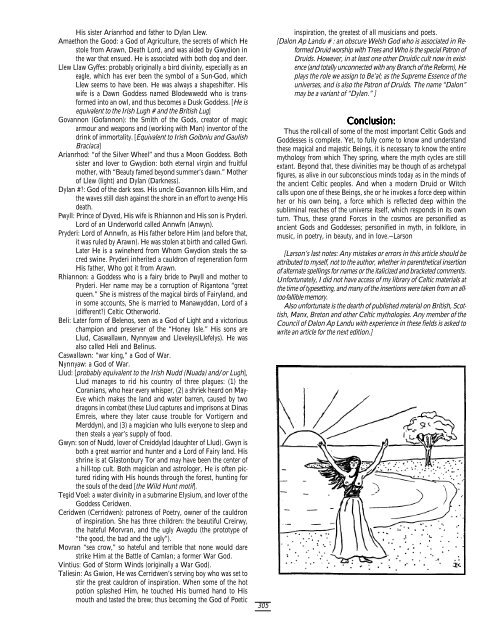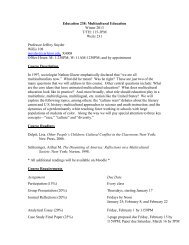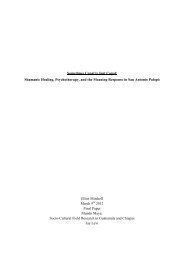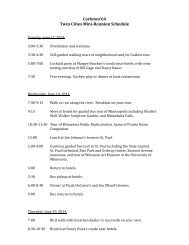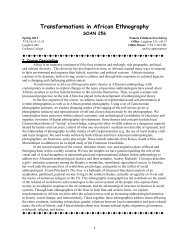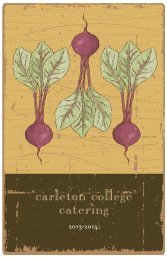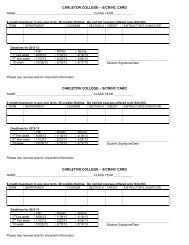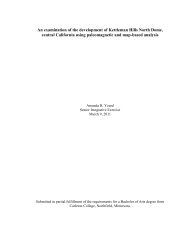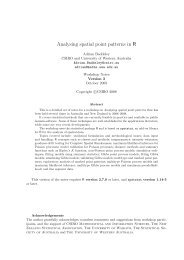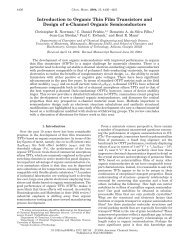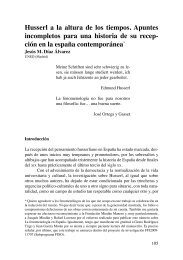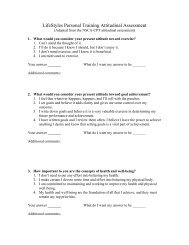babababababababababababababab the druid ... - Carleton College
babababababababababababababab the druid ... - Carleton College
babababababababababababababab the druid ... - Carleton College
You also want an ePaper? Increase the reach of your titles
YUMPU automatically turns print PDFs into web optimized ePapers that Google loves.
His sister Arianrhod and fa<strong>the</strong>r to Dylan Llew.<br />
Amaethon <strong>the</strong> Good: a God of Agriculture, <strong>the</strong> secrets of which He<br />
stole from Arawn, Death Lord, and was aided by Gwydion in<br />
<strong>the</strong> war that ensued. He is associated with both dog and deer.<br />
Llew Llaw Gyffes: probably originally a bird divinity, especially as an<br />
eagle, which has ever been <strong>the</strong> symbol of a Sun-God, which<br />
Llew seems to have been. He was always a shapeshifter. His<br />
wife is a Dawn Goddess named Blodewwedd who is transformed<br />
into an owl, and thus becomes a Dusk Goddess. [He is<br />
equivalent to <strong>the</strong> Irish Lugh # and <strong>the</strong> British Lug]<br />
Govannon (Gofannon): <strong>the</strong> Smith of <strong>the</strong> Gods, creator of magic<br />
armour and weapons and (working with Man) inventor of <strong>the</strong><br />
drink of immortality. [Equivalent to Irish Goibniu and Gaulish<br />
Braciaca]<br />
Arianrhod: “of <strong>the</strong> Silver Wheel” and thus a Moon Goddess. Both<br />
sister and lover to Gwydion: both eternal virgin and fruitful<br />
mo<strong>the</strong>r, with “Beauty famed beyond summer’s dawn.” Mo<strong>the</strong>r<br />
of Llew (light) and Dylan (Darkness).<br />
Dylan #?: God of <strong>the</strong> dark seas. His uncle Govannon kills Him, and<br />
<strong>the</strong> waves still dash against <strong>the</strong> shore in an effort to avenge His<br />
death.<br />
Pwyll: Prince of Dyved, His wife is Rhiannon and His son is Pryderi.<br />
Lord of an Underworld called Annwfn (Anwyn).<br />
Pryderi: Lord of Annwfn, as His fa<strong>the</strong>r before Him (and before that,<br />
it was ruled by Arawn). He was stolen at birth and called Gwri.<br />
Later He is a swineherd from Whom Gwydion steals <strong>the</strong> sacred<br />
swine. Pryderi inherited a cauldron of regeneration form<br />
His fa<strong>the</strong>r, Who got it from Arawn.<br />
Rhiannon: a Goddess who is a fairy bride to Pwyll and mo<strong>the</strong>r to<br />
Pryderi. Her name may be a corruption of Rigantona “great<br />
queen.” She is mistress of <strong>the</strong> magical birds of Fairyland, and<br />
in some accounts, She is married to Manawyddan, Lord of a<br />
(different?) Celtic O<strong>the</strong>rworld.<br />
Beli: Later form of Belenos, seen as a God of Light and a victorious<br />
champion and preserver of <strong>the</strong> “Honey Isle.” His sons are<br />
Llud, Caswallawn, Nynnyaw and Lleveleys(Llefelys). He was<br />
also called Heli and Belinus.<br />
Caswallawn: “war king,” a God of War.<br />
Nynnyaw: a God of War.<br />
Llud: [probably equivalent to <strong>the</strong> Irish Nudd (Nuada) and/or Lugh],<br />
Llud manages to rid his country of three plagues: (1) <strong>the</strong><br />
Coranians, who hear every whisper, (2) a shriek heard on May-<br />
Eve which makes <strong>the</strong> land and water barren, caused by two<br />
dragons in combat (<strong>the</strong>se Llud captures and imprisons at Dinas<br />
Emreis, where <strong>the</strong>y later cause trouble for Vortigern and<br />
Merddyn), and (3) a magician who lulls everyone to sleep and<br />
<strong>the</strong>n steals a year’s supply of food.<br />
Gwyn: son of Nudd, lover of Creiddylad (daughter of Llud). Gwyn is<br />
both a great warrior and hunter and a Lord of Fairy land. His<br />
shrine is at Glastonbury Tor and may have been <strong>the</strong> center of<br />
a hill-top cult. Both magician and astrologer, He is often pictured<br />
riding with His hounds through <strong>the</strong> forest, hunting for<br />
<strong>the</strong> souls of <strong>the</strong> dead [<strong>the</strong> Wild Hunt motif].<br />
Tegid Voel: a water divinity in a submarine Elysium, and lover of <strong>the</strong><br />
Goddess Ceridwen.<br />
Ceridwen (Cerridwen): patroness of Poetry, owner of <strong>the</strong> cauldron<br />
of inspiration. She has three children: <strong>the</strong> beautiful Creirwy,<br />
<strong>the</strong> hateful Morvran, and <strong>the</strong> ugly Avagdu (<strong>the</strong> prototype of<br />
“<strong>the</strong> good, <strong>the</strong> bad and <strong>the</strong> ugly”).<br />
Movran “sea crow,” so hateful and terrible that none would dare<br />
strike Him at <strong>the</strong> Battle of Camlan; a former War God.<br />
Vintius: God of Storm Winds (originally a War God).<br />
Taliesin: As Gwion, He was Cerridwen’s serving boy who was set to<br />
stir <strong>the</strong> great cauldron of inspiration. When some of <strong>the</strong> hot<br />
potion splashed Him, he touched His burned hand to His<br />
mouth and tasted <strong>the</strong> brew; thus becoming <strong>the</strong> God of Poetic<br />
305<br />
inspiration, <strong>the</strong> greatest of all musicians and poets.<br />
[Dalon Ap Landu # : an obscure Welsh God who is associated in Reformed<br />
Druid worship with Trees and Who is <strong>the</strong> special Patron of<br />
Druids. However, in at least one o<strong>the</strong>r Druidic cult now in existence<br />
(and totally unconnected with any Branch of <strong>the</strong> Reform), He<br />
plays <strong>the</strong> role we assign to Be’al; as <strong>the</strong> Supreme Essence of <strong>the</strong><br />
universes, and is also <strong>the</strong> Patron of Druids. The name “Dalon”<br />
may be a variant of “Dylan.” ]<br />
Conclusion:<br />
Conclusion:<br />
Thus <strong>the</strong> roll-call of some of <strong>the</strong> most important Celtic Gods and<br />
Goddesses is complete. Yet, to fully come to know and understand<br />
<strong>the</strong>se magical and majestic Beings, it is necessary to know <strong>the</strong> entire<br />
mythology from which They spring, where <strong>the</strong> myth cycles are still<br />
extant. Beyond that, <strong>the</strong>se divinities may be though of as archetypal<br />
figures, as alive in our subconscious minds today as in <strong>the</strong> minds of<br />
<strong>the</strong> ancient Celtic peoples. And when a modern Druid or Witch<br />
calls upon one of <strong>the</strong>se Beings, she or he invokes a force deep within<br />
her or his own being, a force which is reflected deep within <strong>the</strong><br />
subliminal reaches of <strong>the</strong> universe itself, which responds in its own<br />
turn. Thus, <strong>the</strong>se grand Forces in <strong>the</strong> cosmos are personified as<br />
ancient Gods and Goddesses; personified in myth, in folklore, in<br />
music, in poetry, in beauty, and in love.—Larson<br />
[Larson’s last notes: Any mistakes or errors in this article should be<br />
attributed to myself, not to <strong>the</strong> author, whe<strong>the</strong>r in paren<strong>the</strong>tical insertion<br />
of alternate spellings for names or <strong>the</strong> italicized and bracketed comments.<br />
Unfortunately, I did not have access of my library of Celtic materials at<br />
<strong>the</strong> time of typesetting, and many of <strong>the</strong> insertions were taken from an alltoo-fallible<br />
memory.<br />
Also unfortunate is <strong>the</strong> dearth of published material on British, Scottish,<br />
Manx, Breton and o<strong>the</strong>r Celtic mythologies. Any member of <strong>the</strong><br />
Council of Dalon Ap Landu with experience in <strong>the</strong>se fields is asked to<br />
write an article for <strong>the</strong> next edition.]


